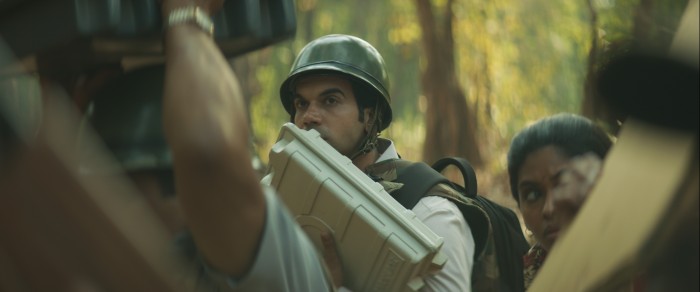
Dir.: Amit V Masurkar; Cast: Rajkummar Rao, Pankaj Tripathy, Anjali Patil; India 2017, 106 min.
Director/co-writer Amit V Masurkar’s second feature is a light-hearted critical analysis of the limits of personal endurance and the validity of elections in an India divided by class and plagued by civil war.
In central India, civil servant Newton (Rao), sees himself as the advocate of a modern country. Unfortunately for him, not many agree with him least of all his parents, who want him married to an under-age bride, who left school at the age of thirteen. Newton (who constructed his name from two Indian names he was given at birth) is understandably angry, clearly his parents just want to benefit from the bride’s generous dowry, at the expense of his future happiness and satisfaction. A strong – but equally naïve – believer in democracy, Newton is sent out as the Returning Officer in a jungle voting polling station where Maoist guerrillas are putting the local inhabitants under pressure not to vote. Newton soon collides with the commander of the military unit, Aatma Singh (Tripathy), who is in charge of security, and does not want to risk the lives of his men in a battle for 76 votes, which he sees as a charade – which is more or less true. But Newton is supported in his zealous efforts to get the village population to vote by the local schoolteacher Maiko (Patil). She is much more realistic than Newton and is able to speak the Ghondi dialect of the region, since the local villagers do not understand Hindi. Whilst Singh charms the clueless UN observers, Newton and Maiko bring the majority of the voters to the ramshackle polling station. There, the ultra modern voting machines – clashing very much with the dilapidated environment, are a challenge too great for the voters – but Singh, eager to please the observers, tells them to “use the machines like toys”, which they do. Newton is still not happy; he wants to wait for the remainder of the local electorate. Losing patience, Singh pretends that Newton and his polling station helpers are under fire from guerrilla forces, and evacuates everyone. Newton, who is not fooled, challenges the commander and the unit with extreme measures.
Newton is a stubborn anti-hero. His achilles heel is a disregard for his better informed friends (Maiko) and foes (Singh). A foreigner in this part of his own country, he is totally unaware of the power positions. The villagers are as much under threat from the guerrillas as the local militia, it does not matter to them which side burns down their houses and steals their food. Their understanding of democracy has nothing to do with the countless names presented on the voting machines – the village elder simply tells Newton that he is “selected to speak for them in the parliament in Delhi”. Newton’s one-man stand may be honourable, but he helps nobody, his pride bordering on arrogance. Still, he is preferable to the opportunists of all colours he encounters, and is rewarded in the end with a personal happy-ending.
Masurkar very clearly shows the limits of parliamentary democracy in a country like India where feudalism and religious bigotry are still the most potent pillars of the state. Newton fails not because of his lack of courage, but because he too believes in a democratic process, which is unachievable under the circumstances. He fails to acknowledge that the poor villagers are the victims of both factions fighting on their behalf. DoP Swapnil S Sonawane creates a real war zone in the jungle, contrasting very much with the city atmosphere Newton is accumstomed too. Rao is convincing as the prickly anti-hero, and Patil’s Maiko is calm and collected – qualities none of the men achieve. AS
BERLINALE 9-19 FEBRUARY 2017 | FORUM